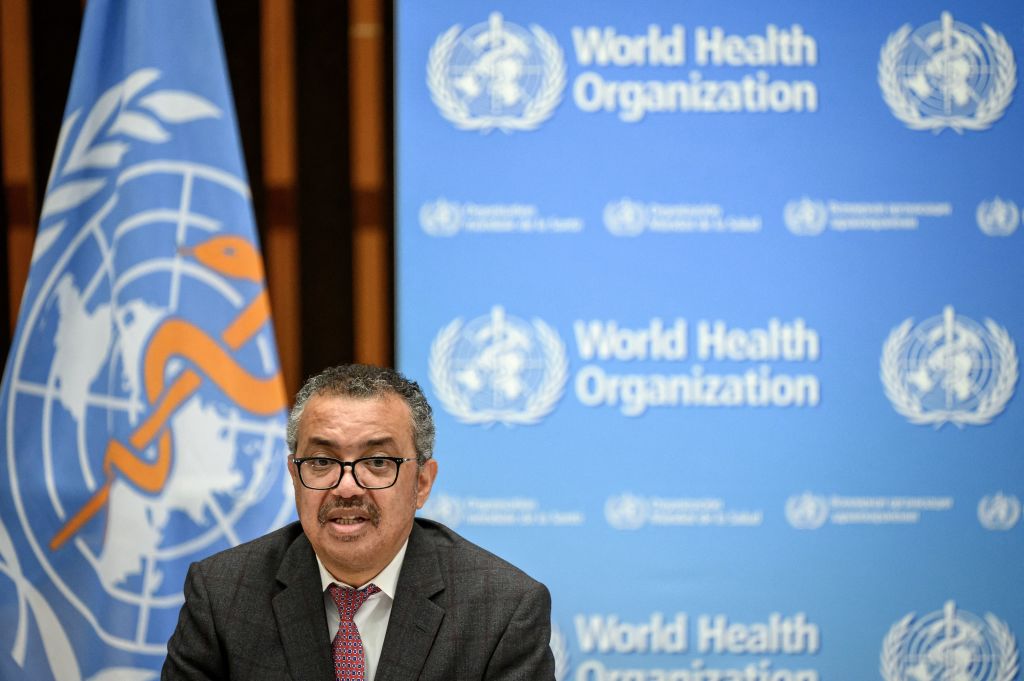WHO chief warns of pathogens that could be 'even deadlier' than Covid-19


A free daily email with the biggest news stories of the day – and the best features from TheWeek.com
You are now subscribed
Your newsletter sign-up was successful
The head of the World Health Organization on Monday warned that future health emergencies could be more severe than the Covid-19 pandemic, and urged the agency's members to start preparing for the next global health crisis, CBS News reported.
Dr. Tedros Adhanom Ghebreyesus, WHO director-general, issued the warning while speaking at the 76th World Health Assembly meeting in Geneva, Switzerland. The message came just weeks after the organization ended the Covid-19 global emergency.
While the threat of Covid still lingers, Tedros said other imminent threats could be even worse. "The threat of another variant emerging that causes new surges of disease and death remains, and the threat of another pathogen emerging with even deadlier potential remains," he said, warning WHO members not to "kick this can down the road" and urging them to make changes in the immediate future. "When the next pandemic comes knocking — and it will — we must be ready to answer decisively, collectively and equitably," Tedros added.
The Week
Escape your echo chamber. Get the facts behind the news, plus analysis from multiple perspectives.

Sign up for The Week's Free Newsletters
From our morning news briefing to a weekly Good News Newsletter, get the best of The Week delivered directly to your inbox.
From our morning news briefing to a weekly Good News Newsletter, get the best of The Week delivered directly to your inbox.
During the annual assembly, which runs from May 21 to May 30, the organization is set to address a number of global health issues, including "future pandemics, eradicating polio and supporting steps to ease Ukraine's health emergency triggered by Russia's invasion," Reuters explained. The 194 WHO member states are also drafting a global pandemic treaty and will continue negotiations on that front over the next year. Tedros noted the importance of a "commitment from this generation" to the pandemic treaty "because it is this generation that experienced how awful a small virus could be."
Earlier in the meeting, member countries approved a $6.83 billion budget for the next two years that included a 20% increase in mandatory fees. The new budget "tested national commitments to fixing a WHO funding model which was seen as too small and overly reliant on the vagaries of donors," per Reuters.
A free daily email with the biggest news stories of the day – and the best features from TheWeek.com
Theara Coleman has worked as a staff writer at The Week since September 2022. She frequently writes about technology, education, literature and general news. She was previously a contributing writer and assistant editor at Honeysuckle Magazine, where she covered racial politics and cannabis industry news.
-
 Where to go for the 2027 total solar eclipse
Where to go for the 2027 total solar eclipseThe Week Recommends Look to the skies in Egypt, Spain and Morocco
-
 The end of mass-market paperbacks
The end of mass-market paperbacksUnder the Radar The diminutive cheap books are phasing out of existence
-
 Political cartoons for February 22
Political cartoons for February 22Cartoons Sunday’s political cartoons include Black history month, bloodsuckers, and more
-
 Scientists are worried about amoebas
Scientists are worried about amoebasUnder the radar Small and very mighty
-
 A Nipah virus outbreak in India has brought back Covid-era surveillance
A Nipah virus outbreak in India has brought back Covid-era surveillanceUnder the radar The disease can spread through animals and humans
-
 Trump HHS slashes advised child vaccinations
Trump HHS slashes advised child vaccinationsSpeed Read In a widely condemned move, the CDC will now recommend that children get vaccinated against 11 communicable diseases, not 17
-
 Deaths of children under 5 have gone up for the first time this century
Deaths of children under 5 have gone up for the first time this centuryUnder the radar Poor funding is the culprit
-
 A fentanyl vaccine may be on the horizon
A fentanyl vaccine may be on the horizonUnder the radar Taking a serious jab at the opioid epidemic
-
 Health: Will Kennedy dismantle U.S. immunization policy?
Health: Will Kennedy dismantle U.S. immunization policy?Feature ‘America’s vaccine playbook is being rewritten by people who don’t believe in them’
-
 More adults are dying before the age of 65
More adults are dying before the age of 65Under the radar The phenomenon is more pronounced in Black and low-income populations
-
 Ultra-processed America
Ultra-processed AmericaFeature Highly processed foods make up most of our diet. Is that so bad?
